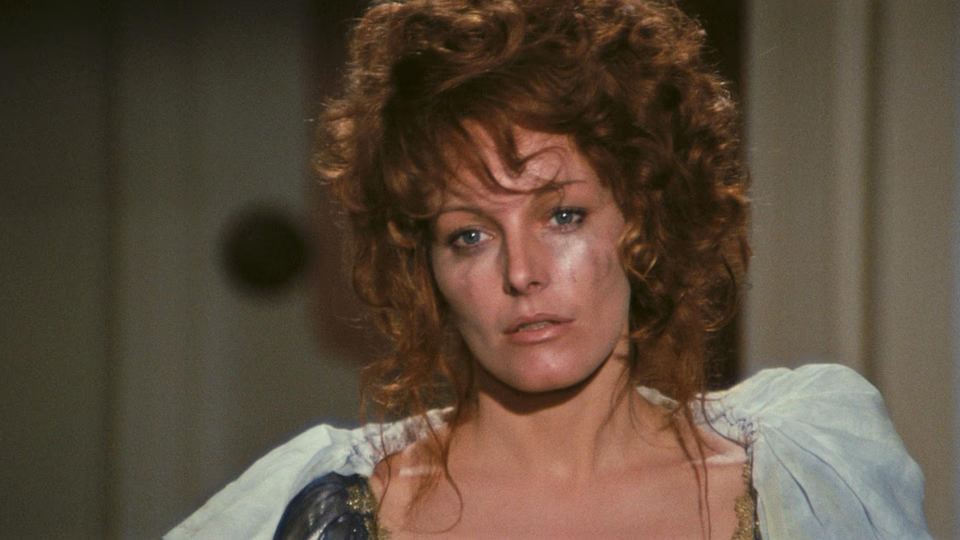Your Vice Is a Locked Room and Only I Have the Key

It’s the best Lucio Fulci giallo not directed by Lucio Fulci.
The story concerns Irina, played by Anita Strindberg, who fears her abusive husband Oliviero, played by Luigi Pistilli, may kill her. When their niece Floriana, played by Edwige Fenech, arrives for an unexpected visit, it proves a tipping point.
The performers shine. Pistilli radiates menace. Leering from his heavy brow, he carries a perpetual sense of coiled rage searching for an outlet. Opposite him, Strindberg does the tricky job of playing a woman coming unhinged. With her hair in a medusa-like updo, her eyes always wide and darting, and her movements jerky, she’s a crumbling beauty.
But it’s Fenech who surprises. She’s top-billed but doesn’t show up until half an hour into the picture. A sloe-eyed beauty, she oozes a cunning confidence that proves magnetic. She’s the comely assistant to distract from the script’s magic trick leaps of logic.
The film credits three screenwriters: Ernesto Gastaldi, Adriano Bolzoni, and Sauro Scavolini. One wonders if they collaborated or if the film amalgamates their separate scripts. Much of the film’s charm lies in how it morphs from one thriller archetype to another. The initial setup sees Irina afraid Oliviero is a black-gloved killer preying on young women in the town. This plot resolves itself with a surprise reveal of the killer’s identity. Then the film morphs into a Diabolique-style setup involving Irina and Floriana. This carries on until the film pivots again into a riff on Edgar Allan Poe’s “The Black Cat” for the finale.
Director Sergio Martino drenches everything in a sweaty sleaze. Pistilli literally sweats through the entire film, his unshaven face covered in a perpetual sheen. It’s hinted his character, Oliviero, had an incestuous relationship with his recently deceased mother.
This sexual power metaphor becomes more explicit with a scene where the maid sits looking at a porno mag before a noise disturbs her and she ventures downstairs, puts on Oliviero’s mother’s gown, and begins fondling herself in the mirror. Later, we get a shot where a woman’s buttocks—clad in skin-tight shorts—fill the screen as she bends over, before a man strolling by slaps her on the ass. The metaphor culminates in a lesbian seduction scene which, of course, features ample female nudity.
The film also serves up a fair amount of blood as the killer slashes throats and even includes some animal ocular violence lifted from Poe’s story.
The nudity and violence are all gratuitous, but fit the cynical story which sees nearly every character corrupt to some degree. By inviting the audience to enjoy the sleaze, the film makes us culpable, an accomplice to its characters’ deviant behavior. Consider the scene where Oliviero watches as Floriana has sex with their milkman. Are we not just as voyeuristic as Oliviero?
Indeed, between the sleaze, the plethora of early closeups of characters’ eyes, and the later ocular violence, one could be fooled into thinking this was a Lucio Fulci picture. Just as Martino’s The Case of the Scorpion’s Tail built upon Argento’s The Bird with the Crystal Plumage, this film seems to build on Fulci’s A Lizard in a Woman’s Skin, with its early scene involving the local hippies and the hedonistic undertones.
Bruno Nicolai’s jazz score gives it away, however, as does the relatively gore-free third act. One can imagine that Fulci would have delivered much more explicitly gruesome fates for the final three victims.
It’s that aforementioned third act that keeps the film from greatness. A better film would have built to a gore and sleaze crescendo, a memorable set piece to sear into the viewer’s brain. Consider how Argento would end his adaptation of “The Black Cat” in 1990’s Two Evil Eyes. Still the film proves entertaining, and giallo fans should love it.